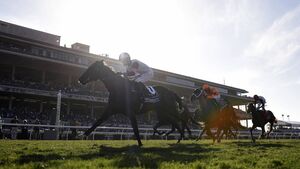The racing dynasty that keeps building

Balantina ridden by Oisin Murphy on the way to victory in the Breeders' Cup Juvenile Fillies Turf race on day one of the 2025 Breeders' Cup World Championships at Del Mar race track, California. Picture: Orlando Ramirez/Getty Images
Every empire has its rituals. Rome had its legions, Austria its symphonies. Ballydoyle has its mornings – and the ritual doesn’t change, no matter where in the world it finds itself.
Whether it’s in the Tipperary fog or California sun, the shape is always the same: horses emerging from the half-dark, one after another, perfectly spaced. Ahead of the Breeders’ Cup last week they looked almost spectral in the distance. Their breath rose like incense, their hooves whispered on the dirt. For a moment, even Del Mar, a place accustomed to noise and fanfare, fell into reverent silence.
The American commentators, normally fluent in hyperbole, were suddenly short of words. You could hear the awe under the chatter, that strange mixture of fascination and fear. Because this wasn’t just another visiting team warming up for the Breeders’ Cup – it was the travelling wing of a dynasty.
From that farm in Tipperary, Aidan O’Brien has built something that looks less like a training operation and more like a monarchy with horses instead of heirs. He trains for the flatlands of Ireland and Europe, on turf that rolls like silk, and yet every November he crosses the Atlantic to test his perfection against America’s dirt.
He arrived this year level with the late D. Wayne Lukas as the most successful trainer in the history of the Breeders’ Cup. And as O’Brien watched his horses stretch into that first gallop beneath the Californian sun, it was hard not to feel that we were watching more than preparation. This was ceremony and continuity, the steady march of the most formidable dynasty the sport has ever known.
The Breeders’ Cup is racing’s grand convocation, two days when every tribe gathers to see whose gospel holds true. Europe brings the turf: grass, patience, rhythm. America brings the dirt: speed, risk, noise. They call it the World Cup of thoroughbred racing, but it’s closer to a theological debate – two belief systems arguing over what makes a horse divine.
For most European trainers, crossing the Atlantic is a pilgrimage attempted rarely and nervously. Their horses are raised on rolling green, taught to float rather than fight. American racing can feel like another planet. The locals breed for breakneck speed, for the burn of hooves and the grit of survival. A European horse wins here only when something extraordinary aligns: courage, adaptation and a defiance of nature.
Yet somehow, O’Brien made it ordinary. What others treat as an expedition, he treats as administration. Year after year, the lorries roll out of Ballydoyle and onto airplanes bound for Kentucky or California, each animal prepped with the same precision.
There’s a kind of quiet madness in that – to impose Irish order on American chaos and make it look routine. But that’s O’Brien’s genius. He builds systems so complete they appear effortless. His staff talk about detail the way monks talk about prayer. Horses move from stable to track like parishioners to pew. Even here, in a sport built on chance, he has found a way to choreograph luck.
And this year, the faith spread another branch. His son Donnacha struck first blood with Balantina in the Juvenile Fillies Turf, sneaking up the rail under a silky ride from Oisín Murphy. It was the kind of victory that seemed written in the family ledger, the next verse of the same hymn. Aidan watched on, with that quiet smile he reserves for moments when either Joseph or Donnacha win, even when it’s at the expense of his own horses.
Because Ballydoyle has never really been about one man. It’s an inheritance now, a dynasty, a growing empire. Dynasties, when they last, do so because they learn how to multiply their purpose. And Ballydoyle has long since outgrown one man’s reach.
Joseph, the eldest son, has already built his own realm, sending champions to win from Melbourne to Paris, proving that the Ballydoyle method travels as well as the bloodlines do. Donnacha, younger but no less assured, also has the calm of someone born to the pressure.
And yet, even as he watched Donnacha’s filly flash home, Aidan’s mind would already have moved to the next race, the next test, the next quiet act of perfection. His gift – and perhaps his curse – is that he never seems to arrive.
The patriarch’s moment in Del Mar finally happened in the last race of the Friday card. Gstaad sat coiled in midfield, unhurried, waiting for the race to declare itself. Then, around the final bend, he moved through the field the way a clock’s hand moves, smooth and certain, as though time had agreed to wait.
By the furlong pole it was clear – the others were labouring and Gstaad was lengthening. And with each stride he carried Aidan O’Brien further into history, a solitary figure now standing above them all as the most successful trainer in the history of the Breeders’ Cup.
As Gstaad cantered back past the winning post, the record books turned a fresh page, and the dynasty added another layer to its legend. Yet even in triumph, the sense was not of arrival but continuation. O’Brien never lingers on the peak; he simply builds another.
And somewhere beyond the lights and applause, you could almost hear the rhythm beginning again – the sound of hooves in Tipperary mist, rehearsing the next act of inevitability.
By Saturday night the dust had shifted again. O’Brien’s tally stayed still, but Bob Baffert struck twice on the dirt, drawing level with the Irish trainer. The scoreboard now reads even: two men, 21 wins apiece.
It sets up a rivalry to look forward to over the coming years. Baffert, all swagger and sunlight, preaching speed to the converted. O’Brien, the ascetic in Tipperary, whispering to his horses in the half-light. One thrives on theatre; the other on order.
Yet the arithmetic favours youth. O’Brien is 56, patient, methodical and still mapping the seasons ahead. Baffert, silver-haired and weathered, knows time has already started its count.
The horses will already be back on Irish soil, trotting through Tipperary mist as if nothing happened. The ritual resumes. The rhythm endures.
That’s the secret of it all. The dynasty doesn’t live in the records or the headlines, but in those quiet mornings when the world is still half-asleep and perfection is being rehearsed again.
Some men chase greatness. Aidan O’Brien breeds it.




